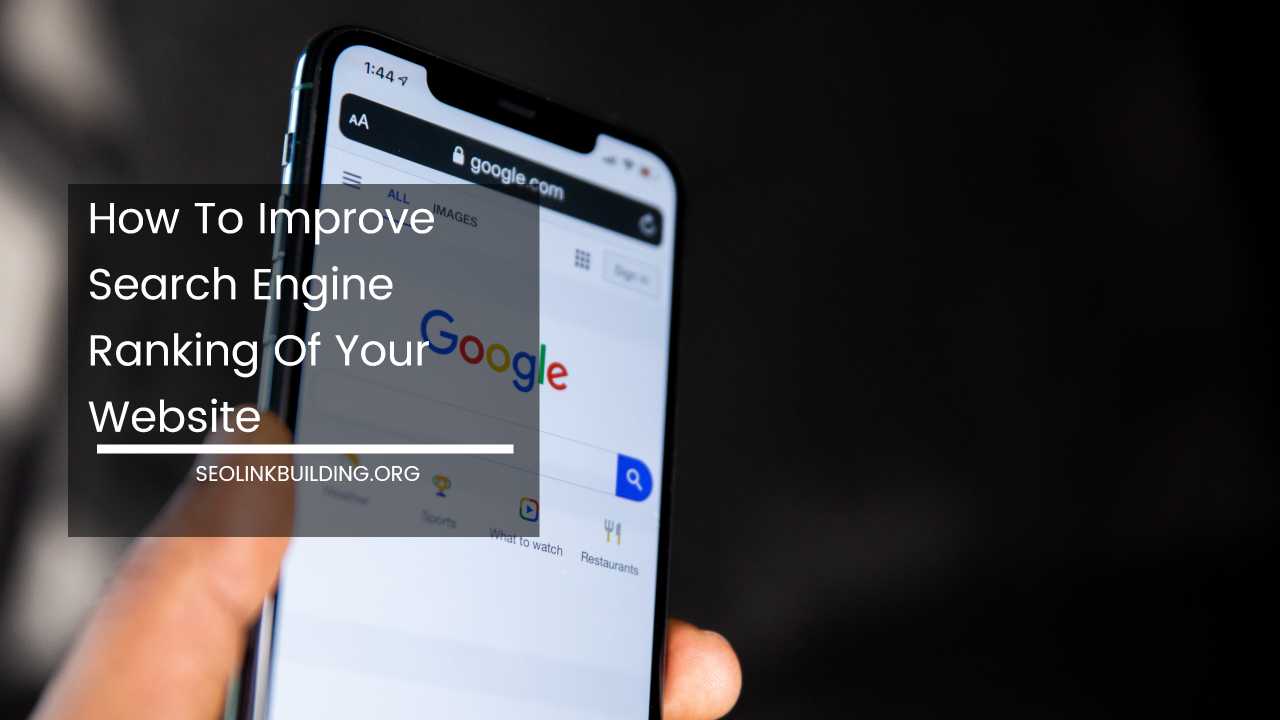How to Improve Search Engine Ranking of Your Website

How To Improve Search Engine Ranking Of Your Website: A Comprehensive Guide
In today’s digital landscape, a strong online presence is crucial for any business. But simply having a website isn’t enough.
To truly thrive, you need your website to rank high in search engine results pages (SERPs) – especially Google, which dominates the search engine market. This is where Search Engine Optimization (SEO) comes in.
SEO is the practice of optimizing your website to improve its organic ranking in search results. The higher your website ranks, the more likely users are to find it, leading to increased traffic, brand awareness, and ultimately, conversions.
This guide delves into everything you need to know about improving your website’s search engine ranking. We’ll cover the fundamentals of SEO, explore key strategies, and provide actionable tips to get you started.
Understanding Search Engines and User Intent
Search engines like Google use complex algorithms to rank websites. These algorithms consider a variety of factors, including:
- Content: The quality, relevance, and freshness of your website’s content.
- Keywords: The words and phrases users search for.
- On-page optimization: How well your website’s content and structure are optimized for search engines.
- Backlinks: Links from other websites to your website.
- User experience (UX): How easy it is for users to navigate and interact with your website.
- Mobile-friendliness: Whether your website is optimized for mobile devices.
Understanding user intent is also crucial. This refers to the reason behind a user’s search query. Are they looking for information, a product, or a service? By optimizing your content for user intent, you can ensure your website provides the answers users are seeking.
Building a Strong SEO Foundation
Before diving into specific tactics, let’s establish a solid SEO foundation for your website:
- Keyword Research: Identify the keywords and phrases your target audience is searching for. Tools like Google Keyword Planner and SEMrush can help you uncover relevant keywords with search volume.
- Competitive Analysis: Analyze your top competitors’ websites. See what keywords they rank for, what type of content they create, and how they structure their website. This will give you valuable insights to inform your own SEO strategy.
- Technical SEO Audit: Ensure your website is technically sound and crawlable by search engines. Use tools like Google Search Console to identify and fix any technical issues that might be hindering your ranking.
Content is King: Creating High-Quality, SEO-Friendly Content
Content is the backbone of any successful SEO strategy. Here’s how to create high-quality, SEO-friendly content:
- Target Relevant Keywords: Integrate your target keywords throughout your content naturally, but avoid keyword stuffing.
- Focus on User Intent: Create content that addresses your target audience’s needs and search queries.
- Provide Value: Offer informative, engaging, and well-written content that establishes your expertise and builds trust with your audience.
- Optimize for Readability: Use clear headings, subheadings, bullet points, and images to break up text and improve readability.
- Content Freshness: Regularly update your website with fresh content to keep users engaged and signal activity to search engines.
On-Page Optimization Techniques
On-page optimization refers to optimizing the individual pages of your website for search engines:
- Page Titles and Meta Descriptions: Craft compelling and informative page titles and meta descriptions that accurately reflect the content of your page and include relevant keywords.
- Header Tags (H1-H6): Use clear and descriptive header tags to structure your content and improve readability.
- Image Optimization: Optimize image sizes for faster loading times and use descriptive alt text that includes relevant keywords.
- Internal Linking: Link to other relevant pages on your website to improve user experience and help search engines understand your website’s structure.
- URL Structure: Use clear and descriptive URLs that include relevant keywords.
Building Backlinks: The Power of Credibility
Backlinks are links from other websites to your website. Search engines view backlinks as a sign of trust and authority. Here’s how to build high-quality backlinks:
- Create Link-worthy Content: Develop content so valuable and informative that other websites naturally want to link to it.
- Guest Blogging: Contribute guest articles to relevant websites in your niche. Include a link back to your website in your author bio.
- Broken Link Building: Find broken links on relevant websites and reach out to the website owners, suggesting your content as a replacement.
- Online Directories: Submit your website to relevant online directories and business listings.
Technical SEO: Ensuring Your Website Runs Smoothly
Technical SEO ensures your website’s technical aspects are optimized for search engines and users:
- Mobile-Friendliness: In today’s mobile-first world, having a mobile-friendly website is no longer optional. Google prioritizes mobile-friendly websites in search results. Use Google’s Mobile-Friendly Test tool to check your website’s responsiveness and make necessary adjustments.
- Website Speed: A slow website can significantly hurt your SEO and user experience. Optimize your website for speed by using a Content Delivery Network (CDN), compressing images, and minimizing code. Tools like Google PageSpeed Insights can help you identify areas for improvement.
- Structured Data Markup: Implement structured data markup to provide search engines with additional information about your content. This can help your website appear in rich snippets, which can improve click-through rates.
- Website Security: A secure website with a valid SSL certificate is crucial for building trust with users and search engines alike.
Local SEO: Dominating Your Local Market
If your business has a physical location or caters to a local audience, local SEO is essential. Here’s how to optimize your website for local search:
- Claim and Optimize Your Google My Business Listing: Claim and update your Google My Business listing with accurate information like your business name, address, phone number, website URL, and opening hours. Encourage customers to leave positive reviews on your listing.
- Optimize for Local Keywords: Include relevant geographic keywords in your website content, meta descriptions, and page titles.
- Local Citations: Build citations for your business across online directories and local websites. Ensure your NAP (Name, Address, Phone number) is consistent across all listings.
Advanced SEO Techniques: Taking Your Optimization to the Next Level
Once you’ve mastered the fundamentals, explore advanced SEO techniques to further refine your strategy:
- Voice Search Optimization: With the rise of voice search, optimize your content for natural language queries. Use long-tail keywords and conversational language.
- Entity Building: Establish your website as an authority on a particular topic by earning mentions on relevant websites and industry publications.
- Video SEO: Video content is highly engaging and can significantly improve your website’s ranking. Optimize your video titles, descriptions, and tags with relevant keywords.
- User Engagement Metrics: While traditional SEO focuses on search engine ranking, user engagement metrics like dwell time, bounce rate, and click-through rate are becoming increasingly important. Focus on creating content that keeps users engaged on your website.
SEO Tools and Resources
Several valuable tools and resources can help you on your SEO journey:
- Google Search Console: This free tool from Google provides valuable insights into your website’s SEO performance. You can use it to submit your sitemap, monitor crawl errors, track backlinks, and analyze search traffic.
- Google Analytics: Gain a deeper understanding of your website traffic with Google Analytics. Track website visits, user demographics, user behavior, and conversions.
- Keyword Research Tools: Tools like Google Keyword Planner, SEMrush, and Ahrefs can help you discover relevant keywords, analyze search volume, and identify competitor keyword strategies.
- SEO Backlink Checker Tools: Use tools like Ahrefs, Moz Link Explorer, and SEMrush to track your backlinks, identify lost or broken backlinks, and discover new backlink opportunities.
Staying Ahead of the Curve: SEO Trends in 2024
The SEO landscape is constantly evolving. Here are some key trends to stay ahead of in 2024:
- Focus on User Experience: Search engines are placing increasing emphasis on user experience (UX) when ranking websites. Ensure your website is mobile-friendly, loads quickly, and provides a seamless user experience.
- Content Quality and Expertise: High-quality, informative content that establishes your expertise is crucial for ranking well.
- Evolving Search Intent: Search engines are becoming more sophisticated in understanding user intent. Craft content that addresses the specific needs of your target audience.
- Voice Search Optimization: As voice search continues to gain popularity, optimize your website for natural language queries.
- Mobile-First Indexing: Google has moved to mobile-first indexing, meaning the mobile version of your website is considered the primary version for indexing. Ensure your mobile website is optimized for search.
Bonus Tips :
- Promote Your Content: Don’t just create great content and hope people find it. Promote your content on social media, email marketing campaigns, and other online channels.
- Measure and Analyze: Track your SEO progress using website analytics tools. Monitor your website traffic, ranking positions, and user engagement metrics. Analyze your data and make adjustments to your strategy as needed.
- Stay Informed: The SEO landscape is constantly evolving. Stay up-to-date on the latest trends and algorithm updates by following SEO blogs, attending industry conferences, and subscribing to SEO newsletters.
- Hire an SEO Specialist: If you don’t have the time or resources to manage your SEO in-house, consider hiring an SEO specialist or agency. They can provide expert guidance and implement a comprehensive SEO strategy for your website.
The Road to SEO Success
By following the strategies outlined in this comprehensive guide, you’ll be well on your way to achieving SEO success.
Remember, SEO is a journey, not a destination. Be patient, stay focused on delivering exceptional value to your audience, and continuously adapt your strategy to the ever-evolving search engine landscape.
With dedication and effort, you can transform your website into a powerful traffic magnet, achieve your online business goals, and leave your competitors in the dust.













